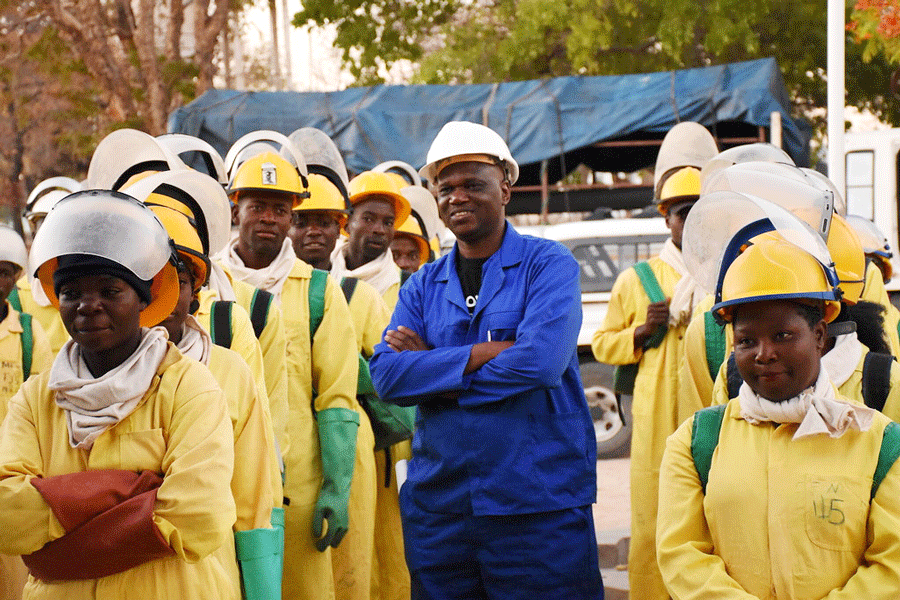
By Jennifer Curle
The women who work as malaria insecticide spray operators for USAid’s indoor residual spraying (IRS) programme start their day early in the morning to avoid the heat.
Spray season in Zimbabwe occurs during the hottest time of the year — the November and December rainy season. The spray operators prepare for their daily work by donning thick, bright yellow overalls; a helmet with a visor; a face mask; a cloth around the neck; bright green rubber gloves that reach to the elbows; and thick, heavy rubber utility boots. The safety gear is necessary to protect the spray operators from the insecticide as they battle one of Zimbabwe’s deadliest enemies — the mosquito. On top of all the gear, they carry a haversack containing all the materials they need in the field and their weapon — a spray canister full of insecticide.
Malaria remains among the top three causes of illness and death in Zimbabwe, where over half the population is at risk of contracting the disease. Children under the age of five and pregnant women are among the most vulnerable. However, malaria is a preventable and treatable disease caused by female Anopheles mosquitoes infected with the malaria parasite.
The United States Agency for International Development (USAid) has advanced the US President’s Malaria Initiative (PMI) in Zimbabwe since 2011. The initiative prevents malaria transmission and improves treatment to reduce malaria morbidity and related deaths. One of the ways that PMI combats malaria is through IRS, which applies long-lasting insecticides on the walls and ceilings of dwellings to kill the malaria-carrying mosquitoes. In the last decade, the coordinated efforts of USAid, the Global Fund, and the National Malaria Control Programme have contributed to a substantial drop in malaria cases in Zimbabwe from 1,2 million in 2008 to 264 278 in 2018 — a 78% reduction.
In Zimbabwe, the spray operators have traditionally been viewed as men’s roles, since women are often responsible for looking after their children and performing daily household chores, including farming. IRS is a seasonal job that requires the spray operators to be away from home for several weeks. There is a one-week training program for all operators, and even if they have already gone through the training, they must attend as a refresher course. The first phase of the IRS campaign is 21 days, then there is a one-week break, so they can go home and recuperate, followed by 15 more days of spraying.
Historically, the required time away from home has discouraged women from participating in this kind of work because it would prevent them from their domestic responsibilities. As explained by Tairsai Katiyo, the PMI VectorLink (USAID’s PMI partner) gender-focused person and a provincial coordinator for the program, “women were perceived as not strong enough to manage the strenuous work involved with indoor residual spraying, and they couldn’t stay away from home for the entire 35 days [of the spray campaign], leaving behind their families.”
This seasonal work, however, provides significant income that women were missing out on. To increase women’s participation, PMI VectorLink actively recruits women to be part of the IRS programme as spray operators. As a result, women now make up nearly 25% of the IRS operators in Zimbabwe.
- Chamisa under fire over US$120K donation
- Mavhunga puts DeMbare into Chibuku quarterfinals
- Pension funds bet on Cabora Bassa oilfields
- Councils defy govt fire tender directive
Keep Reading
The female spray operators with children depend on the support from both their families and communities because of expectations in Zimbabwe that caring for young children is a woman’s responsibility. The female spray operators usually have their spouses’ support because of the extra income for the home.
According to the Clinton Global Initiative, studies show that women invest up to 90% of their incomes back into their families, compared to just 30-40% by men.
Anecdotal evidence shows that this is also the case for the female spray operators. “The money is used to buy food, clothes, and school fees for their children,” explained Katiyo.
IRS is a labour-intensive job, and all spray operators are expected to do the same work and reach the same targets. Each day they are expected to spray at least nine structures, moving from homestead to homestead, often walking up to 10km a day, all while wearing heavy safety gear.
It is important for all spray operators to meet their targets and work efficiently and effectively since their job security relies on it. The spray operators are re-enrolled into the program based on their performance. Good performance can lead to a promotion as a team leader or supervisor. “Ever since women have been recruited into the IRS programme, they have appeared to work well with their male counterparts,” said Katiyo.
PMI promotes a work environment that is safe and friendly for all workers. Spray operators must shower after spray to minimize the risk of insecticide contamination. Female sprayers have separate facilities (tents, changing areas, showers, and toilets) from the men to ensure their privacy is maintained.
In Zimbabwe, there have been no recorded cases of sexual discrimination or harassment during the program and all the spray operators are trained on how to deal with potential discrimination. The training builds respect for each other. There is even a motto: “We are all equal.” Moreover, the female spray operators have earned the respect of their male counterparts because of how efficient and successful they are at the job, suggesting that these experiences can begin to transform gender norms in Zimbabwe.
IRS requires homeowners to remove all belongings from their homes. Community members are sometimes reluctant to clear and vacate their homes and have strangers go in and spray the insecticide. The female spray operators take more time to explain the benefits of spraying and prevention of malaria and unnecessary death to hesitant community members. This is important because missed homesteads could have a detrimental impact on the campaign, leaving people vulnerable and at risk of malaria infection.
Women are particularly affected by malaria because Zimbabwean gender norms expect women to care for sick family members. This is why the female spray operators, in particular, are aware of the importance of the IRS campaign. They appreciate the impact of the programme to eradicate malaria, saving lives as they witness the decrease in malaria infections and deaths with each passing year.
Being a spray operator is not simply going into people’s homes and spraying; it involves being an “ambassador” for the PMI programme. “They are doing the work for their communities to reduce the incidence of malaria, and they do it wholeheartedly,” says Katiyo.
l Jennifer Curle is documentation, outreach and communications officer at the USAid-Zimbabwe.











